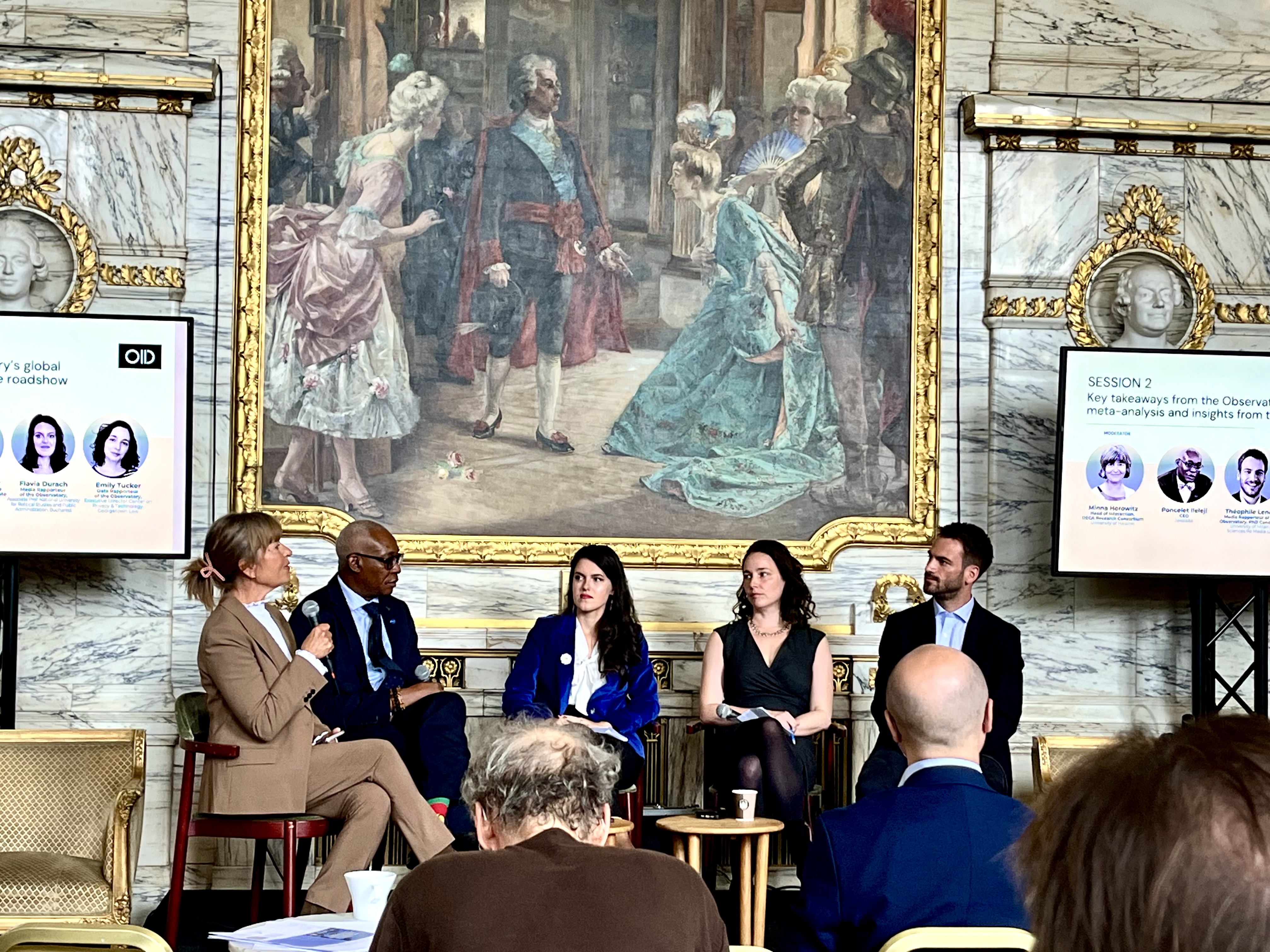





Blog: The power of tech companies must be contested – and more attention is needed to the system level

Text: Salla Tuomola
Who owns information, and who controls knowledge? At the Observatory on Information and Democracy’s latest dialogue, scholars and practitioners confronted the growing power of tech platforms and the urgent need for systemic change.
Systemic challenges to democracy in the digital age
The greatest challenges to democracy stem from within. Troubling arguments resonate across the globe, as societies seek ways to renew systemic structures in response to the growing power of tech companies and platformization. The concluding international dialogue of the Observatory on Information and Democracy (OID), held in September in Stockholm, Sweden, focused on the pressing challenges confronting democracy today.
Since the core issues are embedded in the very systems we live in, greater attention must be paid to systemic structures. This is how Courtney Radsch views the current situation. She serves as Director of the Center for Journalism and Liberty at the Open Markets Institute. “Democracy is a system – and this conversation is about the systems we live within. Tech platforms monopolize the markets they operate in, and when these systems are governed by U.S. tech companies and certain political actors who influence media ecosystems, the problem becomes even more profound than we may realize, ”argues Radsch.
Among other points, Radsch emphasizes that our traditional normative tools, such as media literacy, are no longer sufficient. Therefore, what is needed now is critical research into the regulations, tools, policies, and strategies that existing systems employ, and those they should develop, to limit the power of technology companies over these systems. “We need to design research that tackles fundamental questions capable of influencing policymakers, rather than limiting ourselves to narrow perspectives focused on individual actors or a handful of platforms. It’s also essential to consider how we can promote research that remains independent of corporate funding,” Radsch states.
Voices from the observatory: expert perspectives
Similar concerns were echoed during the event’s panel discussions. Key challenges for the news media were identified as financial sustainability, the growing complexity driven by platformization, and ownership issues – all of which threaten democratic processes and erode trust between media and audiences. “We have created a situation where the media is either in the hands of politicians or tech companies. Platformization has shifted our trust from journalists and journalism to podcasters and social media,” states Admire Mare, Associate Professor in the Department of Communication and Media at the University of Johannesburg.
One of the most pressing challenges identified was that troubling information circulating on platforms often benefits politicians and reinforces their hold on power. Emily Tucker, Executive Director at the Center on Privacy & Technology at Georgetown Law invited reflection on whether society – traditionally anchored in institutions – is shifting toward one increasingly dominated by technology companies. At the core of this transformation lies a critical question: Who owns information, and who holds power over knowledge? Tucker further emphasized that challenging datafication alone is insufficient when the real issue is confronting the power of technology companies: “If the United States fails to regulate them, it becomes extremely difficult for the rest of the world,” she warned.
The OID’s core mission is to deepen understanding of how the information landscape shapes democratic processes. Its latest initiative is the book Information Ecosystems and Troubled Democracy, launched in November and published in collaboration with Nordicom at the University of Gothenburg. The volume offers a critical assessment of why contemporary information systems pose risks to democracy, drawing on research from both the Global North and the Global Majority World on transformations in news media, artificial intelligence, and data governance.
Global imbalances in research and representation
One of the book’s authors, Professor Emerita Robin Mansell, who serves as Scientific Director of the Observatory’s first research cycle, reflected on the scale of the preceding project, which involved synthesizing more than 3,000 sources and 1,600 citations across 84 countries, and coordinating contributions from 400 experts and researchers to produce the report that laid the groundwork for the book. Mansell still identifies areas that can be addressed in future work.
“Only 22% of the report’s content came from the Global World. That is a gap that needs to be addressed. The entire media ecosystem is at risk, as copyright and ownership issues, along with the rise of AI, are set to become major challenges across the industry. If the report were produced today, we would place greater emphasis on data governance throughout. Furthermore, questions about who is drafting new legislation on rules and regulations – and whose voices are excluded from these processes – deserve far more attention,” Mansell states.
The absence of perspectives from the Global Majority World was also raised during the panel discussions. Jhalak M. Kakkar, Executive Director at the Centre for Communication Governance, National Law University Delhi, emphasized that the imbalance in publishing research from the Global North versus the Global Majority World remains a critical issue. “The current narrative needs to be rearticulated. The focus remains on the Global North, where there is still an assumption that knowledge produced there applies universally. Research from Global Majority countries is scarce, and when it does exist, it tends to concentrate on issues such as malnutrition and education rather than on information ecosystems,” Kakkar argues.
**
The text is based on the event that was hosted by the Forum on Information and Democracy, with support from the Swedish Postcode Foundation and the Swedish section of Reporters Without Borders (RSF). The international seminar brought together scholars, NGO leaders, local politicians, and journalists from diverse backgrounds.
arrows & pagination

